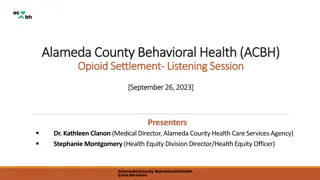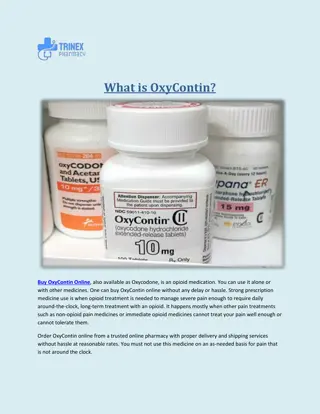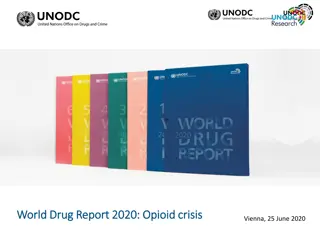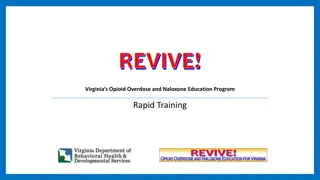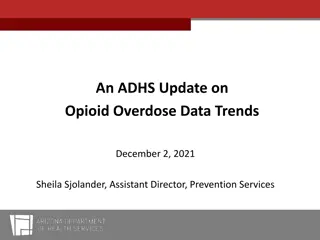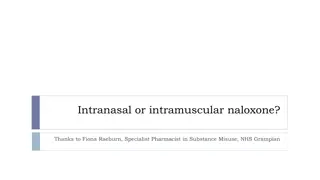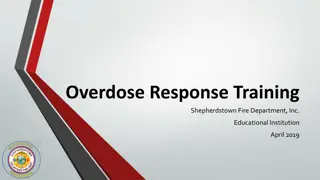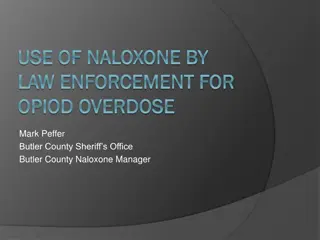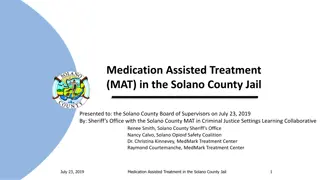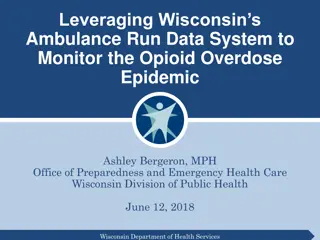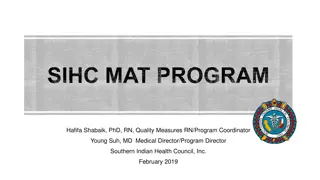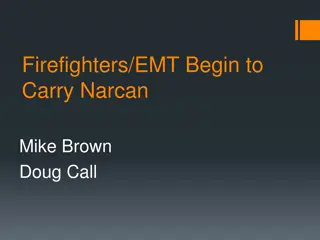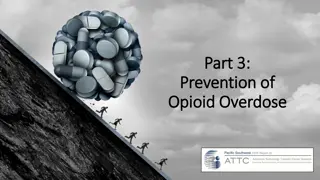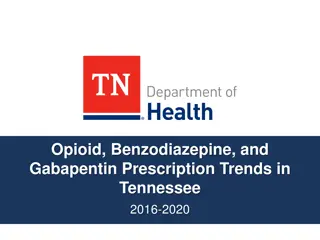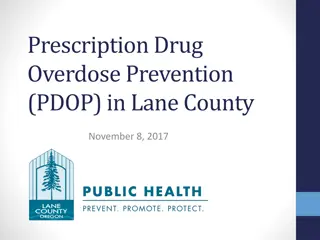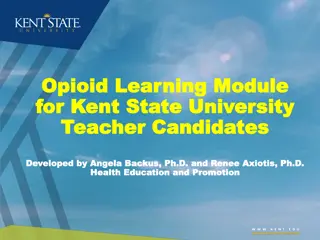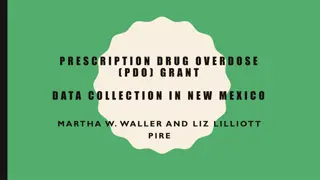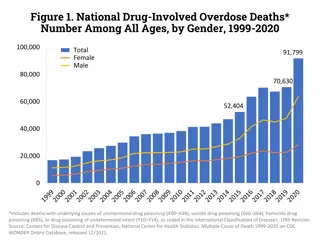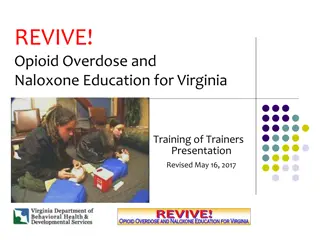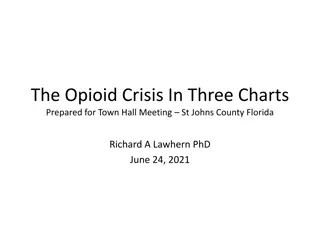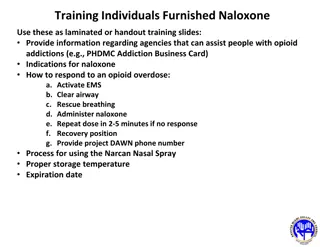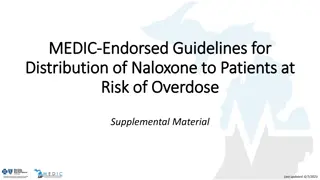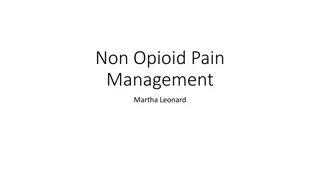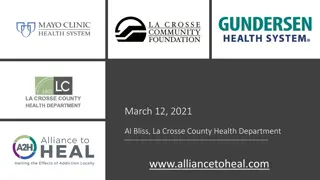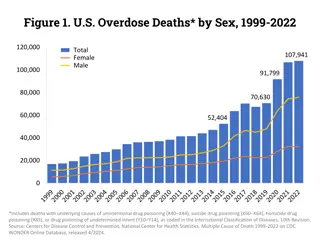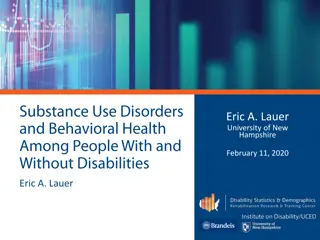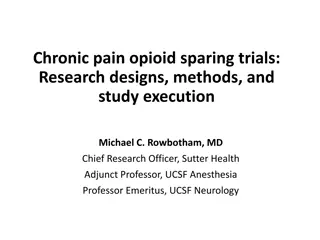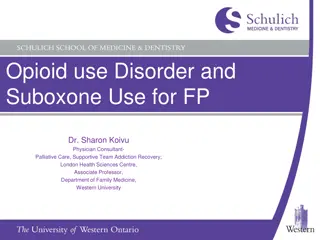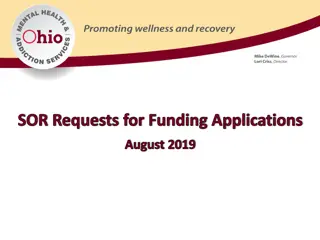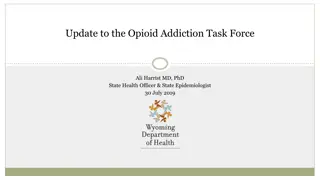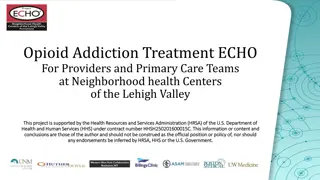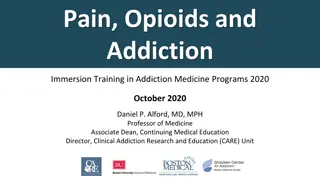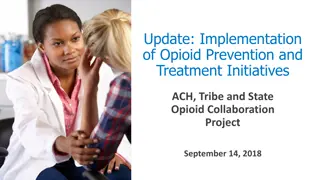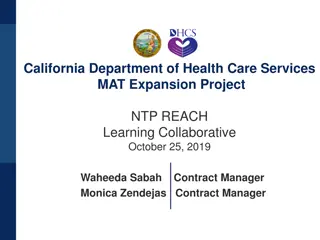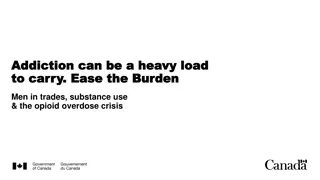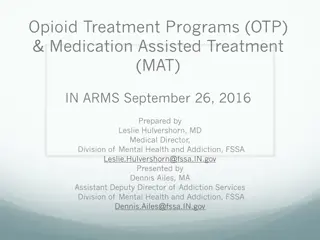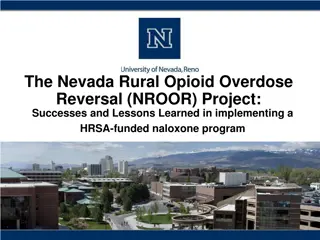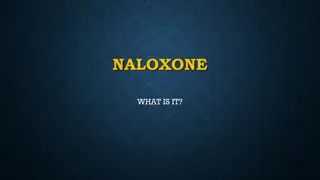Opioid Use Disorder Treatment Guidelines 2024
The February 2024 NYSDOH AIDS Institute Clinical Guidelines Program focuses on assisting clinicians in engaging with patients about opioid use disorder (OUD) treatment goals, emphasizing overdose prevention, providing updated information on available treatment options, and offering recommendations f
2 views • 24 slides
Alameda County Behavioral Health Opioid Settlement Listening Session
Alameda County Behavioral Health (ACBH) conducted a listening session on September 26, 2023, addressing the opioid crisis, definitions of opioids, medication-assisted treatments, and current data on overdose deaths in the county. The session highlighted the rapid increase in opioid-related overdose
1 views • 31 slides
What is OxyContin
OxyContin, also available as Oxycodone, is an opioid medication. You can use it alone or with other medicines. One can buy OxyContin online without any delay or hassle. Strong prescription medicine use is when opioid treatment is needed to manage severe pain enough to require daily around-the-clock,
0 views • 4 slides
Overview of Opioid Crisis in North America and Africa
The opioid crisis in North America and Africa presents common threats and differing dynamics. Factors such as ease of manufacturing, interchangeability of fentanyl and tramadol, and market dynamics contribute to the crisis. In North America, high rates of prescription opioids have led to diversion a
1 views • 26 slides
Understanding Opioid Overdose and Naloxone Education Program in Virginia
The Virginia Opioid Overdose and Naloxone Education Program provide rapid training on opioids, overdose risks, naloxone usage, and emergency response protocols. Opioids include various drugs with potential overdose risk factors such as prior overdoses, reduced tolerance, mixing drugs, and certain me
0 views • 8 slides
Opioid Overdose Data Trends in Arizona
More than 5 Arizonans died from opioids daily in 2020. Opioid deaths totaled 2,500, with varying impacts on different counties. The monthly number of deaths peaked in mid-2020, declined, but increased again in 2021. CDC reported 2,005 opioid-related deaths in April 2021. The majority of fatal and no
0 views • 13 slides
Nasal vs Intramuscular Naloxone: A Comparison for Opioid Overdose Response
When administering naloxone for opioid overdose, choosing between nasal spray and intramuscular injection involves considerations such as ease of use, effectiveness in various conditions, and duration of action. Both methods have their advantages and may depend on individual circumstances. Nasal nal
0 views • 11 slides
Understanding Opioid Overdose Response Training
Learn about opioids, recognizing opioid overdose, and responding to emergencies in this educational training by Shepherdstown Fire Department. Get insights on opioid receptors, hierarchy of opioids, chemical anatomy, and factors putting individuals at risk. Equip yourself with the knowledge to admin
0 views • 29 slides
Naloxone Use by Law Enforcement for Opioid Overdose: Importance and Benefits
Naloxone is a critical medication used by law enforcement to reverse opioid overdoses. The Davids Law-Opioid Overdose Reversal Act allows first responders to possess and administer Naloxone. The Good Samaritan Provision provides immunity to those calling for help during an overdose. Naloxone works b
0 views • 36 slides
Medication Assisted Treatment (MAT) in Solano County Jail - Addressing Opioid Epidemic
Solano County Jail implemented Medication Assisted Treatment (MAT) to combat the opioid crisis, addressing high rates of opioid-related deaths and misuse in the county. National and local data on opioid use, overdose deaths, and access to treatment underscore the need for such initiatives. The Solan
0 views • 19 slides
Monitoring Wisconsin's Opioid Overdose Epidemic Through Ambulance Data
Utilizing Wisconsin's Ambulance Run Data System (WARDS), this initiative aims to enhance opioid overdose surveillance by analyzing nonfatal overdose data in real-time. By developing specific case definitions and identifying key variables of interest, the project seeks to improve the timeliness of mo
0 views • 25 slides
Opioid Crisis in the United States: A Growing Epidemic
Drug overdose deaths, particularly related to opioids, have been on the rise in the United States over the years. The misuse and diversion of prescription opioids, coupled with the availability of cheaper illicit alternatives, have led to a significant increase in opioid-related fatalities. This epi
1 views • 24 slides
Addressing the Opioid Crisis: A Comprehensive Approach to Pain Management
Firefighters and EMTs now carry Narcan to combat opioid overdose, while a clinical perspective reveals challenges in pain management for over 5,000 patients. Issues include inadequate training in pain medicine, leading to unnecessary opioid prescriptions and lack of proper care plans. A solution inv
0 views • 34 slides
Understanding Opioid Overdose and Prevention Methods
The World Health Organization defines opioid overdose as a condition that can lead to respiratory depression and death, often identified by pinpoint pupils, unconsciousness, and respiratory depression. The statistics show a concerning rise in opioid-related deaths, emphasizing the urgent need for pr
0 views • 13 slides
Opioid, Benzodiazepine, and Gabapentin Prescription Trends in Tennessee 2016-2020
This report highlights the trends in opioid, benzodiazepine, and gabapentin prescriptions in Tennessee from 2016 to 2020. It addresses the increasing rates of drug overdose deaths, particularly opioid-related deaths. The data presented shed light on the measures and trends to combat the opioid crisi
0 views • 52 slides
Comprehensive Overview of Prescription Drug Overdose Prevention Efforts in Lane County
Efforts in Lane County to prevent prescription drug overdose include forming alliances, organizing educational sessions for prescribers, promoting Naloxone access, and engaging with the community and law enforcement. Initiatives also involve monitoring and addressing risky prescribing practices and
0 views • 13 slides
Understanding Opioid Use and Prevention in School-Aged Children
This module developed by Angela Backus, Ph.D., and Renee Axiotis, Ph.D., for Kent State University teacher candidates provides an overview of Ohio House Bill 367 on Opioid Use Prevention, information on prescription opioids, heroin, fentanyl, national and state data on the opioid epidemic, how opioi
0 views • 26 slides
Training and Data Collection Tools for Prescription Drug Overdose Grant in New Mexico
This information provides insights into a Prescription Drug Overdose grant program in New Mexico, focusing on training and distributing Naloxone to combat opioid overdose. The program involves a hub and spoke system, where entities like county organizations and local agencies play crucial roles in t
0 views • 22 slides
Trends in National Drug-Involved Overdose Deaths from 1999-2020
The figures depict the alarming rise in drug-involved overdose deaths in the United States over the period 1999-2020. Figure 1 shows the number of deaths by gender, Figure 2 highlights specific drug categories involved, Figure 3 focuses on opioid-related deaths categorized by gender, and Figure 4 de
0 views • 10 slides
Understanding REVIVE! Opioid Overdose and Naloxone Education Training
This presentation covers the REVIVE! training program in Virginia, focusing on opioid overdose response, naloxone education, legislation surrounding safe reporting of overdoses, and the goals of training lay rescuers in recognizing and reversing opioid overdoses.
0 views • 48 slides
Insights on the Opioid Crisis: Analyzing CDC Data and Policy Recommendations
Delve into the complexities of the opioid crisis through an examination of CDC data depicting the relationship between opioid addiction and overdose deaths. Contrary to popular belief, the crisis is not solely attributed to physicians over-prescribing opioids. Gain a deeper understanding of who is p
0 views • 10 slides
Job Corps Physician Monthly Teleconference and Opioid Overdose Response Guidelines
Job Corps conducts a monthly teleconference for physicians across different regions. Zero new cases of COVID-19 among Job Corps students were reported. Guidelines for responding to opioid overdose in Job Corps include the availability of Narcan kits in various locations and staff training on recogni
0 views • 27 slides
Opioid Overdose Prevention and Naloxone Use Training
This comprehensive training resource provides essential information on identifying opioid overdoses, administering naloxone, and responding effectively to opioid emergencies. Learn about agencies offering assistance for opioid addiction, indications for naloxone use, the process for using Narcan Nas
0 views • 12 slides
Understanding Opioid Epidemic Impact & Harm Reduction in Michigan
The Michigan Emergency Department Improvement Collaborative (MEDIC) works to improve emergency care quality, with a focus on opioid overdose. Over 3,000 Michiganders died from opioid overdose in 2021, exceeding motor vehicle-related deaths. Harm reduction strategies, like distributing naloxone in ED
0 views • 10 slides
Understanding Non-Opioid Pain Management Strategies
Non-opioid pain management is crucial in the current opioid epidemic, requiring physicians to navigate chronic pain without relying on opioids. This comprehensive approach involves a deep understanding of non-opioid analgesic medications, the nature of pain, anatomy, and physiology of nociception, t
0 views • 36 slides
Opioid Crisis and Prevention Efforts in La Crosse County
La Crosse County is tackling the opioid crisis through the Alliance to HEAL initiative, aiming to limit opioid supply, raise awareness, and reduce addiction, deaths, and crime. Data shows drug overdose deaths and opioid use trends from 2014 to 2020, highlighting the need for collaborative efforts to
0 views • 13 slides
Opioid Overdose Deaths in the U.S.: Trends and Analysis
The figures illustrate the concerning rise in opioid overdose deaths in the United States from 1999 to 2022. Graphs depict overdose deaths by sex, specific drugs or drug categories, involvement of opioids, and prescription opioids. The data highlights the impact of opioids on both genders and the ro
0 views • 10 slides
Exploring Opioid Use and Disabilities in the United States
This presentation delves into the intersection of opioid use disorders (OUD) among individuals with disabilities, aiming to facilitate their access to appropriate treatment and recovery paths. Despite prevalent opioid-related morbidity, the impact on People with Disabilities (PWD) remains largely un
0 views • 17 slides
Exploring Opioid Sparing Strategies in Chronic Pain Management
This collection of research insights delves into the concept of opioid sparing in chronic pain management, highlighting the potential benefits of lower opioid doses, reduced need for opioids, and mitigating risks associated with opioid use. It discusses the challenges of opioid tapering, patient res
0 views • 18 slides
Opioid Use Disorder and Suboxone Use in Family Practice
Deaths related to prescription opioids are a significant concern in Canada, with opioid-related mortality impacting individuals prescribed opioids. Monitoring long-term opioid therapy is crucial, and guidelines emphasize caution in opioid prescribing practices. Opioid use disorder is a predictable c
0 views • 58 slides
Ohio Opiate Response Continuum Grant for Minority Communities
The Ohio State Opioid Response (SOR) Project aims to establish a comprehensive care system for African American, Hispanic/Latino American, and other minority communities affected by opioid use disorder. The project focuses on integrating physical health, emergency health care, behavioral health care
0 views • 11 slides
Update on Opioid Addiction Task Force with State Health Officer Ali Harrist - July 2019
Review of data on overdose deaths, indicators of opioid use, and special populations by the Opioid Addiction Task Force led by Ali Harrist, MD, PhD. The update covers activities of the Public Health Division, Behavioral Health Division, and Vital Statistics Services in Wyoming. Data sources include
0 views • 33 slides
Comprehensive Opioid Addiction Treatment Information for Providers
This project, supported by HRSA, provides valuable information on opioid addiction treatment, including medication options, effective interventions, and important considerations. Key topics covered include medication treatment, disclosures, medications for opioid use disorder, euphoria, and pharmaco
0 views • 24 slides
Understanding Chronic Pain, Opioids, and Addiction in Medicine
Chronic pain is a complex issue that can impact individuals on various levels. It is important to understand the subjective nature of pain and the barriers to adequate pain care. Opioid analgesics, while effective in managing pain, come with risks such as side effects, addiction, and overdose potent
0 views • 28 slides
Washington State's Opioid Prevention and Treatment Initiatives Update
Washington State is actively implementing opioid prevention and treatment initiatives to address the rising opioid-related overdose deaths and disparities. The state's response plan includes tackling gaps in prevention, treatment, and recovery support to reduce the opioid disease burden. Key data hi
0 views • 74 slides
Efforts to Combat Opioid Epidemic in California
California's Department of Health Care Services is leading a comprehensive effort to address the opioid epidemic in the state. Through the MAT Expansion Project and various coordinated initiatives, they are focusing on reducing overdose deaths, increasing access to treatment, and enhancing monitorin
0 views • 12 slides
Impact of Opioid Crisis on Men in Trades: Addressing Work Culture and Health Risks
The opioid overdose crisis has significantly affected men in trades, leading to a high number of opioid-related deaths and hospitalizations. This issue is exacerbated by factors such as over-reliance on pain medication, illicit drug use, and the high physical demands of their work. Men in trades oft
0 views • 28 slides
Understanding Opioid Treatment Programs and Medication-Assisted Treatment
Opioid Treatment Programs (OTPs) and Medication-Assisted Treatment (MAT) integrate behavioral therapy with medications for substance use disorders like opioid dependency. Combining medications with counseling offers a holistic approach to help individuals reduce or stop opioid use. The summary cover
0 views • 41 slides
Implementing Naloxone Program in Rural Nevada: Successes and Lessons Learned
The Nevada Rural Opioid Overdose Reversal (NROOR) Project focused on purchasing and distributing naloxone, training healthcare professionals, and improving health outcomes in rural areas with opioid overdose incidents. Led by dedicated project personnel and key partnerships, the program aimed to add
0 views • 33 slides
Understanding Naloxone and Overdose Prevention
Naloxone is a prescription medication used to reverse the effects of opioid drugs and prevent overdose deaths. Available in different forms, Naloxone can be administered by intramuscular injection or intranasal spray. Immediate intervention with Naloxone can save lives by reversing the effects of op
0 views • 8 slides

